|
|
|
Sort Order |
|
|
|
Items / Page
|
|
|
|
|
|
|
| Srl | Item |
| 1 |
ID:
038485
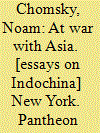

|
|
|
|
|
| Publication |
New York, PAntheon books, 1970.
|
| Description |
313p.hbk
|
| Standard Number |
0394462106
|
|
|
|
|
|
|
|
|
|
|
|
Copies: C:1/I:0,R:0,Q:0
Circulation
| Accession# | Call# | Current Location | Status | Policy | Location |
| 011447 | 959.053/CHO 011447 | Main | On Shelf | General | |
|
|
|
|
| 2 |
ID:
115588
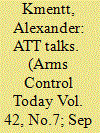

|
|
|
| 3 |
ID:
172845
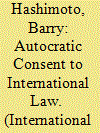

|
|
|
|
|
| Summary/Abstract |
This article contributes to an understanding of why autocrats have accepted the jurisdiction of the International Criminal Court. Leveraging their ability to obstruct their own prosecution, autocrats have traded off the risk of unwanted prosecutions against the deterrent threat that prosecutions pose to political rivals and patrons of their enemies conspiring to oust them. The risk of unwanted prosecutions and the court's deterrent threat both arise because ICC prosecutions credibly communicate guilt for international crimes to capital-disbursing democracies, which may, insofar as possible, use leader-specific economic statecraft to prevent the administration of foreign states by those whom the court signals are guilty of international crimes. Analysis using fixed effects and matching shows that a greater reliance on capital publicly financed by democracies increased the probability that a state accepted the court's jurisdiction only when it was an autocracy (1998–2017). ICC jurisdiction also lengthened the tenure of autocrats and reduced the severity of civil conflict in autocracies.
|
|
|
|
|
|
|
|
|
|
|
|
|
|
|
|
| 4 |
ID:
107148
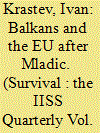

|
|
|
|
|
| Publication |
2011.
|
| Summary/Abstract |
Ten years after the last war in the region, the Balkans is still an assemblage of frustrated protectorates and weak states. Bosnia and Kosovo are trapped in the labyrinthine politics of semi-independence; Albania, Macedonia and Montenegro are small and claustrophobic republics with populist and divisive governments and opposition forces that are discouraged and discouraging at the same time. Serbia has not yet made up its mind how to reconcile its position on Kosovo with its aspiration to join the European Union. Croatia has succeeded in its accession talks with the EU, which closed on 30 June 2011, but the mood of the public is dire due to mismanagement and corruption scandals. The Balkans currently reflects a mixture of Greek-style economic problems, Berlusconi-style politics and Turkish-level hopes when it comes to joining the EU. With Italy and Greece facing deep political and economic troubles of their own, the Balkans has lost its natural advocates for EU membership.
|
|
|
|
|
|
|
|
|
|
|
|
|
|
|
|
| 5 |
ID:
034517


|
|
|
|
|
| Publication |
s.l., Sint Niklaas Waas, 1970.
|
| Description |
155p.
|
|
|
|
|
|
|
|
|
|
|
|
Copies: C:1/I:0,R:0,Q:0
Circulation
| Accession# | Call# | Current Location | Status | Policy | Location |
| 009342 | 016.364151/VAN 009342 | Main | On Shelf | General | |
|
|
|
|
| 6 |
|
| 7 |
ID:
114191
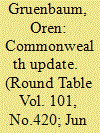

|
|
|
|
|
| Publication |
2012.
|
| Summary/Abstract |
There was little progress in negotiations over the disputed ousting of former president Mohamed Nasheed in the Maldives. In a landmark ruling, the former Liberian president Charles Taylor was found guilty of aiding war crimes and crimes against humanity in Sierra Leone's civil war. Malawi's vice-president Joyce Banda succeeded President Bingu wa Mutharika despite an apparent coup attempt by the brother and ministers of the late Mutharika. There were hopes of a 'Malaysian spring' as record numbers of protesters took to the streets. Pakistan's supreme court found the prime minister, Yousaf Raza Gilani, guilty of contempt of court. The kingdom of Barotseland declared it was seeking to secede peacefully from Zambia.
|
|
|
|
|
|
|
|
|
|
|
|
|
|
|
|
| 8 |
ID:
155430
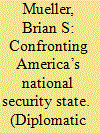

|
|
|
|
|
| Summary/Abstract |
Investigating war crimes committed by U.S. officials during the Vietnam War, the Institute for Policy Studies (IPS) anticipated the human rights revolution of the 1970s. Striving to undo the national security state that fostered such criminal enterprises, IPS intellectuals looked to the citizenry to limit immoral and illegal activities abroad.
|
|
|
|
|
|
|
|
|
|
|
|
|
|
|
|
| 9 |
ID:
089289
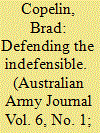

|
|
|
| 10 |
ID:
192656
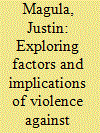

|
|
|
|
|
| Summary/Abstract |
The Soviet-Afghan War serves as a significant case study to understand why states resort to violent acts against civilians during war. This study takes a multidimensional approach, examining strategic, operational, and individual factors and applying theories of violence and mass killing. By analyzing the conditions that led the Soviets to target civilians, this investigation identifies a nexus of interconnected factors. At the strategic level, Soviet leaders pursued a swift victory to establish a Communist client regime while minimizing casualties and controlling information flow. Operationally, the ill-preparedness of the Red Army for counterinsurgency warfare, coupled with an entrenched organizational culture, led to the adoption of counterproductive enemy-centric tactics against Afghan noncombatants. Additionally, inadequate training, prolonged deployments, and a lack of disciplinary measures at the individual level contributed to the perpetration of violent acts. Understanding the underlying causes of violence against civilians, particularly in the context of Russian forces, holds practical importance. This knowledge can assist policymakers in devising strategies that mitigate wartime violence and enhance the protection of citizens. Drawing parallels to contemporary conflicts involving Russia, the study concludes by recommending future research directions and emphasizing the relevance of comprehending the targeting of noncombatants in ongoing conflicts, notably the Russian-Ukrainian conflict.
|
|
|
|
|
|
|
|
|
|
|
|
|
|
|
|
| 11 |
ID:
133276


|
|
|
|
|
| Publication |
2014.
|
| Summary/Abstract |
Although some rebel groups work hard to foster collaborative ties with civilians, others engage in egregious abuses and war crimes. We argue that foreign state funding for rebel organizations greatly reduces incentives to "win the hearts and minds" of civilians because it diminishes the need to collect resources from the population. However, unlike other lucrative resources, foreign funding of rebel groups must be understood in principal-agent terms. Some external principals-namely, democracies and states with strong human rights lobbies-are more concerned with atrocities in the conflict zone than others. Multiple state principals also lead to abuse because no single state can effectively restrain the organization. We test these conjectures with new data on foreign support for rebel groups and data on one-sided violence against civilians. Most notably, we find strong evidence that principal characteristics help influence agent actions.
|
|
|
|
|
|
|
|
|
|
|
|
|
|
|
|
| 12 |
ID:
106988
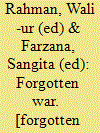

|
|
|
|
|
| Publication |
Dhaka, Bangladesh Heritage foundation, 2011.
|
| Description |
181p.
|
| Standard Number |
9789843323590
|
|
|
|
|
|
|
|
|
|
|
|
Copies: C:1/I:0,R:0,Q:0
Circulation
| Accession# | Call# | Current Location | Status | Policy | Location |
| 056158 | 954.9205/RAH 056158 | Main | On Shelf | General | |
|
|
|
|
| 13 |
ID:
173769
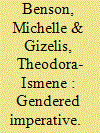

|
|
|
|
|
| Summary/Abstract |
There is increasing awareness that sexual violence is distinct from other aspects of civilian victimization in civil wars. Few studies have examined the independent impact of such violence on responses to civil wars as compared to “traditional” forms of violence. This article explores whether reports of high levels of rape and sexual violence increase the probability of United Nations (UN) attention to conflicts and calls to action. In so doing, we combine original data on UN Security Council (UNSC) resolutions with data on sexual violence in armed conflict and estimate the impact of sexual violence on UN attention to all civil wars from 1990 to 2009. We show that the effects of sexual violence on the number and level of UNSC resolutions are significant even when controlling for other important determinants of UN action. These findings have important implications for understanding how the UN has expanded its view on protecting civilians.
|
|
|
|
|
|
|
|
|
|
|
|
|
|
|
|
| 14 |
ID:
085768
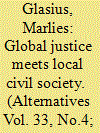

|
|
|
|
|
| Publication |
2008.
|
| Summary/Abstract |
As a new justice institution, the International Criminal Court (ICC) needs to gain legitimacy not just with states but also in civil society, both at the global level and in the societies in which it intervenes. This article, based on interviews, NGO documents, newspaper articles, and participatory observation, looks at civil-society relations with the ICC in relation to its most recent and least publicized investigation-that in the Central African Republic (CAR). It charts the role of civil-society organizations, local and international, in the opening of the investigation, and it discusses the initial responses to the investigation of civil-society figures and victims in the CAR. It finds that unlike in any of the other situations, the ICC's involvement in the CAR has been largely instigated by local civil-society figures and that, as a result, it operates in a quite receptive context. However, the slow pace of investigations and trials, the meager outreach to date, and the court's probable lack of capacity to provide victims with physical and material security are long-term challenges for its ability to meet local expectations of justice.
|
|
|
|
|
|
|
|
|
|
|
|
|
|
|
|
| 15 |
ID:
111247
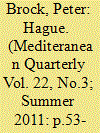

|
|
|
|
|
| Publication |
2011.
|
| Summary/Abstract |
In its third year, the inquisition of Radovan Karadzic is supposedly nearing the halfway mark, as the prosecution is milking the dregs of its case in hopes of discovering a pearl of credibility - if not sanity - for the International Criminal Tribunal for the Former Yugoslavia at The Hague. It's a sure bet that by 2014 the appeal will be upheld for guilt of committing various war crimes. That assumes the tribunal still has a defendant, since two Serbian presidents and one Serbian mayor, among others, have died in ICTY custody. Who knows what the surreal judicial alchemy shall produce next? Certainly not "justice."
|
|
|
|
|
|
|
|
|
|
|
|
|
|
|
|
| 16 |
ID:
193477
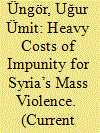

|
|
|
|
|
| Summary/Abstract |
After more than a decade of armed conflict in Syria, few perpetrators of mass violence have been held accountable for their actions. The Assad regime is the prime sponsor of impunity for these human rights abuses, but global and regional powers also bear responsibility for allowing the perpetuation of atrocities.
|
|
|
|
|
|
|
|
|
|
|
|
|
|
|
|
| 17 |
ID:
148045
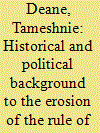

|
|
|
|
|
| Summary/Abstract |
reflection of deepening divides along political and ethnic lines. During this civil war the Sri Lankan Government and its security forces have been implicated in unlawful killings carried out in a pervasive manner against civilians, whilst at the same time specifically targeting ethnic Tamils, humanitarian workers and journalists. The human rights of all citizens suffered as a result and ultimately led to the weakening of the rule of law. With the end of the civil war, the Sri Lankan Government has made little progress in providing accountability for wartime abuses. Its absence of and reluctance to ensure justice is seen as a logical culmination of decades of impunity. The importance of acknowledging historical behaviour and taking accountability for past violations will be discussed. In an analysis for paving the way to a new democracy in Sri Lanka, the main outcomes of this article are calls for accountability arising out of the government’s actions during the war; an investigation into the present state of human rights, the rule of law and finally; an examination into the political solution going forward to ensure a process of reconciliation and peaceful co-existence.
|
|
|
|
|
|
|
|
|
|
|
|
|
|
|
|
| 18 |
ID:
034868
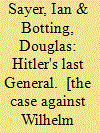

|
|
|
|
|
| Publication |
London, Bantam Press, 1989.
|
| Description |
xv, 393p.Hbk
|
| Standard Number |
0593017099
|
|
|
|
|
|
|
|
|
|
|
|
Copies: C:1/I:0,R:0,Q:0
Circulation
| Accession# | Call# | Current Location | Status | Policy | Location |
| 032154 | 923.543/SAY 032154 | Main | On Shelf | General | |
|
|
|
|
| 19 |
ID:
074937
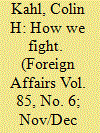

|
|
|
|
|
| Publication |
2006.
|
| Summary/Abstract |
Reports that U.S. troops may have killed 24 civilians in Haditha, Iraq, last November have renewed fears that the U.S. military routinely violates the laws of war. But is the Haditha incident the exception or the rule? In fact, U.S. compliance with noncombatant immunity in Iraq has been relatively high by historical standards, and it has been improving since the beginning of the war.
|
|
|
|
|
|
|
|
|
|
|
|
|
|
|
|
| 20 |
ID:
096685
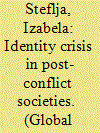

|
|
|
|
|
| Publication |
2010.
|
| Summary/Abstract |
Being attentive to initial reconstruction of identities in post-conflict environments is critical because robust group images are absent and there remains time and space for shifts in policy. Applying theories of social psychology, overlooked in literature on ethnic violence, peace-building, and reconciliation, this article examines characteristics and consequences of the emerging socio-psychological trend of 'defensive nationalism' in post-conflict Serb narratives. The article argues that the proceedings of the International Criminal Tribunal for the Former Yugoslavia (ICTY) have contributed to an identity crisis among the Serbs, and identifies the issues of 'individual versus collective' guilt and 'legal versus political' trials as major factors. The destabilization of the Serb self-image on the global scene has instigated new, and furthered old, forms of defensiveness, leading to the dismissal of the tribunal's proceedings in favor of contradictory and conspiracy accounts. The point of conducting fair and effective prosecutions is undermined if reconciliation opportunities are simultaneously diminished.
|
|
|
|
|
|
|
|
|
|
|
|
|
|
|
|
|
|
|
|
|